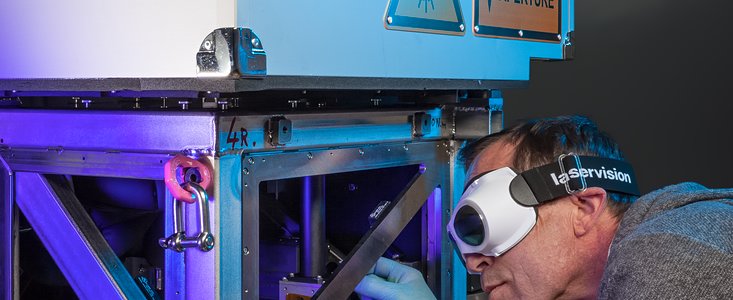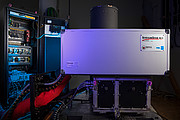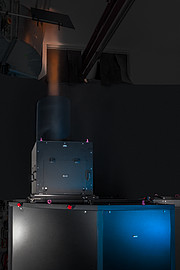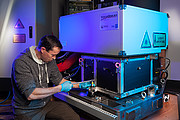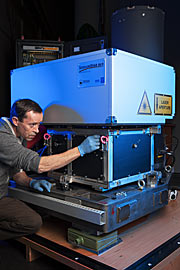Annuncio
Accettate e spedite in Cile le unità di stelle guida laser
Il sistema a 4 stelle guida laser supera un traguardo fondamentale
27 Novembre 2015
Tutte le quattro unità che formano il sistema a 4 stelle guida laser — un componente essenziale dello strumento di ottica adattiva (AOF) del Very Large Telescope dell’ESO — sono state accettate e spedite in Cile. Si tratta di un passo importante per l'UT4 del VLT, che avrà un'ottica completamente adattiva, con una qualità delle immagini notevolmente migliorata.
Un sistema di ottiche adattive usa dei sensori per analizzare la turbolenza atmosferica e uno specchio deformabile integrato nel telescopio per correggere le distorsioni delle immagini causate dall'atmosfera. Tuttavia, per poter descrivere accuratamente la turbolenza, è fondamentale avere una stella luminosa puntiforme molto vicina all’oggetto studiato nel cielo.
È raro che ci sia una stella vera proprio al posto giusto che serva per questo compito. Quindi, per correggere la turbolenza atmosferica in ogni area del cielo e per tutti i possibili bersagli, è necessaria una stella artificiale. Tali stelle possono essere create proiettando un potente raggio laser nel cielo, verso lo strato di sodio in cui si crea un bagliore luminoso che, da terra, appare puntiforme come una stella.
Misurando i movimenti e le distorsioni causati dall'atmosfera a queste stelle artificiali e facendo di conseguenza minuscoli aggiustamenti allo specchio deformabile secondario, mille volte al secondo, il telescopio può produrre immagini con una sensibilità di gran lunga superiore a quella ottenuta senza le ottiche adattive.
La prima unità di stelle guida laser dello strumento di ottica adattiva è stata installata sul VLT ed è stata testata in loco con successo all’inizio di quest’anno. I test hanno confermato la validità del progetto realizzato dall’ESO in collaborazione con partner industriali e istituti scientifici europei [1]. I test sul quarto telescopio del VLT in Cile hanno dimostrato un’elevata qualità ottica, fornendo un’immagine quasi perfetta di una stella artificiale, e un’alta efficienza nell’eccitazione dello strato di sodio. Grazie a questi successi, il team può procedere con i test preliminari su GRAAL, il modulo di ottiche adattive che alimenta HAWK-I, lo strumento per l’acquisizione di immagini a campo largo sul quarto telescopio principale (UT4); sono tutti ulteriori passi verso la completa messa in funzione dello strumento di ottica adattiva al Paranal.
Lo strumento di ottica adattiva userà quattro laser simultaneamente, cosa che permetterà una migliore descrizione delle proprietà dell’atmosfera — e perciò un campo visivo più ampio nel quale l’immagine viene corretta — rispetto a quanto sia possibile con un solo laser.
Quando sarà completamente installato, lo strumento di ottiche adattive fornirà la luce a due strumenti, HAWK-I (collegato a GRAAL) e lo spettrografo a campo integrale, MUSE (collegato a GALACSI).
Notes
[1] Tra le società coinvolte: TOPTICA (Germania); TNO (Paesi Bassi); MPB Communications (Canada); Optec (Italia); Astrel (Italia); e Laseroptik (Germania). Oltre a queste, INAF–Osservatorio di Roma, che ha contribuito in maniera significativa al progetto.
Links
- Ulteriori informazioni sul laser
- Ulteriori informazioni sullo specchio deformabile secondario
- Ulteriori informazioni sul telescopio laser
Contatti
Domenico Bonaccini Calia
ESO
Garching bei München, Germany
Tel: +49 89 3200 6567
Email: dbonacci@eso.org
Wolfgang Hackenberg
ESO
Garching bei München, Germany
Tel: +49 89 3200 6782
Email: whackenb@eso.org
Richard Hook
ESO, Public Information Officer
Garching bei München, Germany
Tel: +49 89 3200 6655
Cell: +49 151 1537 3591
Email: rhook@eso.org
A proposito dell'annuncio
| Identificazione: | ann15089 |
Our use of Cookies
We use cookies that are essential for accessing our websites and using our services. We also use cookies to analyse, measure and improve our websites’ performance, to enable content sharing via social media and to display media content hosted on third-party platforms.
ESO Cookies Policy
The European Organisation for Astronomical Research in the Southern Hemisphere (ESO) is the pre-eminent intergovernmental science and technology organisation in astronomy. It carries out an ambitious programme focused on the design, construction and operation of powerful ground-based observing facilities for astronomy.
This Cookies Policy is intended to provide clarity by outlining the cookies used on the ESO public websites, their functions, the options you have for controlling them, and the ways you can contact us for additional details.
What are cookies?
Cookies are small pieces of data stored on your device by websites you visit. They serve various purposes, such as remembering login credentials and preferences and enhance your browsing experience.
Categories of cookies we use
Essential cookies (always active): These cookies are strictly necessary for the proper functioning of our website. Without these cookies, the website cannot operate correctly, and certain services, such as logging in or accessing secure areas, may not be available; because they are essential for the website’s operation, they cannot be disabled.
Functional Cookies: These cookies enhance your browsing experience by enabling additional features and personalization, such as remembering your preferences and settings. While not strictly necessary for the website to function, they improve usability and convenience; these cookies are only placed if you provide your consent.
Analytics cookies: These cookies collect information about how visitors interact with our website, such as which pages are visited most often and how users navigate the site. This data helps us improve website performance, optimize content, and enhance the user experience; these cookies are only placed if you provide your consent. We use the following analytics cookies.
Matomo Cookies:
This website uses Matomo (formerly Piwik), an open source software which enables the statistical analysis of website visits. Matomo uses cookies (text files) which are saved on your computer and which allow us to analyze how you use our website. The website user information generated by the cookies will only be saved on the servers of our IT Department. We use this information to analyze www.eso.org visits and to prepare reports on website activities. These data will not be disclosed to third parties.
On behalf of ESO, Matomo will use this information for the purpose of evaluating your use of the website, compiling reports on website activity and providing other services relating to website activity and internet usage.
Matomo cookies settings:
Additional Third-party cookies on ESO websites: some of our pages display content from external providers, e.g. YouTube.
Such third-party services are outside of ESO control and may, at any time, change their terms of service, use of cookies, etc.
YouTube: Some videos on the ESO website are embedded from ESO’s official YouTube channel. We have enabled YouTube’s privacy-enhanced mode, meaning that no cookies are set unless the user actively clicks on the video to play it. Additionally, in this mode, YouTube does not store any personally identifiable cookie data for embedded video playbacks. For more details, please refer to YouTube’s embedding videos information page.
Cookies can also be classified based on the following elements.
Regarding the domain, there are:
- First-party cookies, set by the website you are currently visiting. They are stored by the same domain that you are browsing and are used to enhance your experience on that site;
- Third-party cookies, set by a domain other than the one you are currently visiting.
As for their duration, cookies can be:
- Browser-session cookies, which are deleted when the user closes the browser;
- Stored cookies, which stay on the user's device for a predetermined period of time.
How to manage cookies
Cookie settings: You can modify your cookie choices for the ESO webpages at any time by clicking on the link Cookie settings at the bottom of any page.
In your browser: If you wish to delete cookies or instruct your browser to delete or block cookies by default, please visit the help pages of your browser:
Please be aware that if you delete or decline cookies, certain functionalities of our website may be not be available and your browsing experience may be affected.
You can set most browsers to prevent any cookies being placed on your device, but you may then have to manually adjust some preferences every time you visit a site/page. And some services and functionalities may not work properly at all (e.g. profile logging-in, shop check out).
Updates to the ESO Cookies Policy
The ESO Cookies Policy may be subject to future updates, which will be made available on this page.
Additional information
For any queries related to cookies, please contact: pdprATesoDOTorg.
As ESO public webpages are managed by our Department of Communication, your questions will be dealt with the support of the said Department.
